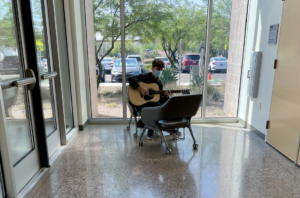Credit Recovery Goes Mainstream
Susan Sawyers wrote a credit recovery story, most of which I have reprinted below, for the The Hechinger Report as part of their productive USA Today partnership. It references Susan Patrick, iNACOL, and John Murray, AdvancePath–I’m a director for both.
Online credit recovery programs are important entry point for competency-based learning as outlined in a recent iNACOL report. Programs like AdvancePath are a good example of blended learning strategies that combine the benefits on personalized online learning with the support of an onsite teachers and mentors.
A growing network of online classes is giving thousands of high school students a second or third chance to pass courses they need to graduate, from algebra and history to health and physical education.
The classes are part of a widening phenomenon called credit recovery — a term that sounds more about erasing debt than advancing education but actually enables troubled students to get credit for classes they’ve previously failed or didn’t complete.
Such opportunities have long been available in summer school. But as pressure mounts in school districts for higher graduation rates, more for-profit companies are cashing in by providing the classes.
The self-paced classes represent one of the fastest growing segments of the $2 billion digital learning market for elementary and secondary students. Forty-six states and the District of Columbia allow students to take classes, including credit recovery, online, says Susan Patrick, president of the Virginia-based International Association for K-12 Online Learning (iNacol). She estimates that at least 250,000 students are taking credit-recovery classes online.
The exact number in such classes is hard to quantify, in part because some students enroll for a course or two, while others are getting through several courses they failed the first time, says Steven Pines, executive director of the Education Industry Association in Rockville, Md.
Increased use of online credit recovery comes at a time school districts are under pressure by states and the federal government to raise graduation rates, hovering nationally around 70%, according to the Editorial Projects in Education Research Center.
At the same time, many districts have been forced to reduce school budgets. “It’s partly economic and partly transforming practice to better serve our students and increase their achievement,” says Themy Sparangis, chief technology director of the Los Angeles Unified School District.
“If online credit-recovery programs connect better with the students, and the students get back on track sooner, we aren’t spending money remediating over and over the same way we always did. ”
The U.S. Department of Education got behind credit recovery when it unveiled a new National Education Technology Plan earlier this month.
Karen Cator, director of the Office of Educational Technology at the U.S. Department of Education, called credit recovery “a critical strategy towards improving the opportunity for more students to graduate.”
Gregg Levin, vice president of Aventa Learning, which supplies credit-recovery classes to 31 cities, said the company’s revenues have grown more than eightfold in the last two school years.
Other providers include education business giants Pearson and Kaplan, which operates as a subsidiary of The Washington Post Co. Karl Gustafson, Pearson’s digital learning vice president, predicts subsidiary NovaNet will see double-digit enrollment growth for the coming year.
Plato Learning, which was recently purchased by Chicago-based private-equity firm Thoma Bravo for $143 million, served twice as many students in 2010 as in 2009, says Mary Schneider, director of marketing. The majority are in credit-recovery classes. Former Plato chairman and CEO John Murray values the online credit-recovery business at $500 million. Murray is now chairman and CEO of AdvancePath Academics, a Virginia provider of alternative education solutions for at-risk high school students. Like iNacol’s Patrick, he estimates 250,000 students are enrolled in online credit-recovery classes.
Politicians and business leaders are hoping to develop standards and policies in the field. Jeb Bush, a former governor of Florida, and Bob Wise, a former governor of West Virginia, announced in August the formation of a Digital Learning Council that will include executives from Apple, Microsoft, Pearson and iNacol. Credit recovery is one of the areas they’ll examine.
Related articles
- Students can make up credits online (usatoday.com)
- Credit Recovery Goes Mainstream (edreformer.com)
- iNACOL Announces Updated National Report: A National Primer on K-12 Online Learning, Version 2 (prnewswire.com)
- Trenton Looks to Go Bold (edreformer.com)
- Virtual School Symposium Online & Blended Learning Conference (edreformer.com)









0 Comments
Leave a Comment
Your email address will not be published. All fields are required.